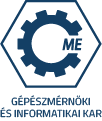| Course objectives: |
| Detailed study about the most important elements of environmentally conscious machinig. The various possible ways to achieve clean machining processes are analysed. |
| Course content and structure: |
| Concept of environmentally friendly technologies. Questions of metal cutting. - Tribological examinations of metal cutting. - Thermal examinations of metal cutting. - Surface finish and integrity. Basis of dry machining. - General environmental problems, emphasised tasks to be solved. - Pros and cons related to environmentally friendly machining. - Concepts of dry machining. - Parameters of dry machining. Basis of machining with minimum volume of coolants and lubricants. - Concepts of machining with minimal volume coolants and lubricants. - Parameters of machining with minimal volume coolants and lubricants. Practice of dry machining (cutting tool materials, cutting processes). Environmental impacts of the application of dry machining and minimal volume cooling manufacturing. |
| Evaluation method: |
| 1 written tests + 1 personal task |
| Required reading: |
| 1. Sutherland, J. W., Kulur, V. N., King, N. C., 2000, An Experimental Investigation of Air Quality in Wet and Dry Turning, Annals of the CIRP, 49/1: 61-64.2. Aoyama, T., 2002, Development of a Mixture Supply System for Machining with Minimal Quantity Lubrication, Annals of the CIRP, 51/1: 289-292. 3. Weinert K, Inasaki I, Sutherland JW, Wakabayashi T.: Dry machining and minimum quantity lubrication, Annals of CIRP, 2004, 53 (2), pp.: 1-28 |
| Suggested reading: |
| 1. Ken Whitelaw: ISO 14001 Environmental Systems Handbook, Second edition, Elsevier Butterworth-Heinemann, 20042. Nolberto Munier: Project Management for Environmental, Construction and Manufacturing Engineers, A Manual for Putting Theory into Practice, Springer Dordrecht Heidelberg New York London, 2013 |


